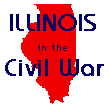

This regiment which was also known as the Third Chicago Board of Trade regiment, was organized in Chicago and mustered into the United states service November 6, 1862. Four companies were raised in Cook County, and three came from Kankakee and three from Iroquois.
It left Camp Hancock, near Camp Douglas, Illinois, on November 6, 1862 and moved to Memphis, Tennessee to report to General Sherman. Here they joined General Grant's Northern Mississippi campaign known as the "Tallahatchie Expedition". It was part of the command that returned with General Sherman from Oxford to Memphis, on December 8, 1862 and embarked on December 24, 1862 with him in his movement against Vicksburg by way of the Yazoo River. It was then brigaded as the Second Brigade, Fourth Division - General Morgan L. Smith, commanding Division and Colonel Giles A. Smith commanding Brigade.
It participated in the Battle of Chickasaw Bayou and went from there to Arkansas Post, where the Regiment lost heavily. After the battle, five companies, C,D,F,I and K, were detailed by order of General Sherman, to guard prisoners of war to the North. These companies were ordered to Springfield to recruit as they were much depleted by overwork and exposure of the trip. When ordered to return to the field every exertion was made by the Colonel commanding, and all intermediate officers, to have them join their comrades in the field, but without avail, until late fall of 1864. After these companies left the, those remaining went to Young's Point, Louisiana, and acted as provost guard for the 15th Army Corps. It held that position until the army went to Milliken's Bend. The One Hundred and Thirteenth was the last Regiment to leave the ground where it buried so many of its brave comrades in arms.
While lying at Young's Point, Colonel Hoge was ordered, with the balance of his Regiment and the Thirteenth United States Infantry, up Black's Bayou, where Admiral Porter, in six or eight of his gunboats, was surrounded by the enemy. After leaving the transport, it had to make a forced march of 25 miles, General Sherman commanding the Brigade, in person and on foot. The country was of such a nature, the Regiment had to march a considerable distance over marsh, single file, on an extemporize bridge (a single plank in width); consequently could take no horses. Came up to the enemy, toward evening, and had a sharp skirmish, driving him back into the timber. The following day, started on its return -the gunboats having been relieved - and reached camp after an absence of ten days.
Remained at Milliken's Bend some two or three weeks, and then started with General Sherman, on the march to the rear of Vicksburg. It participated in the entire Vicksburg Campaign, reaching the defenses of that city on the afternoon of May 18th and took part in the assaults of May 19th and 22nd against Stockade Redan in which the Regiment lost heavily. Colonel Hoge being wounded, on the peremptory order of the Corps Surgeon, he received leave of absence. Shortly after his departure, the Battalion was detailed on provost duty on Chickasaw Bayou, an exceedingly unhealthy place. The result was, in short order almost every officer and man was on the sick list. Major Clark then got an order to proceed to Springfield, Illinois, and take command of five companies there, where he remained till he joined the Battalion, with his command in Memphis, Tennessee, late in the fall of 1864.
Shortly after the fall of Vicksburg, Companies A, B, E, G, and H, were ordered to Corinth, Mississippi, and on October 1,1863, Colonel Hoge was placed in command of that post. He remained in command until the evacuation on January 25, 1864. From there he was ordered to Memphis, and brigaded with the Second Brigade, Post and Defenses of Memphis, Colonel Hoge commanding.
On the 12th of January, 1864, Colonel Hoge was ordered to take command of the following named Regiments and Batteries: 82nd Illinois, 95th Illinois, 108th Illinois, 113th Illinois, 120th Illinois, and Company B, Second Illinois Light Artillery - and join General Sturgis, in his expedition against Forrest. It participated in the disastrous battle of Guntown, Mississippi, where it sustained very heavy losses in killed, wounded and missing.
Shortly thereafter, Colonel Hoge was ordered to take the 113th Illinois, 120ty Illinois, 61st United States Colored Infantry and Company G, First Missouri Light Artillery, and proceed up the Tennessee River. It met with a repulse from a large force under Forrest and returned with the command to Memphis.
On March 25, 1865, Colonel Hoge was appointed Provost Marshall of the District of West Tennessee, and remained in that position till he was mustered out, with his Regiment, June 30, 1865.
The Regiment was then ordered to Chicago, where they received final payment and discharge June 25, 1865.
Contact the webmaster
Web Hosting donated by: Infobahn Outfitters, Inc.
This document: http://illinois.outfitters.com/illinois/history/civil/cw113-hist.html
Last update: Tuesday, 08-Apr-1997 00:25:44 CDT